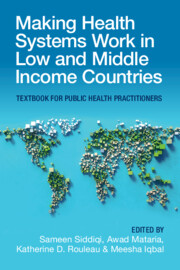 Making Health Systems Work in Low and Middle Income Countries
Making Health Systems Work in Low and Middle Income Countries from Section 1 - Analyzing Health Systems: Concepts, Components, Performance
Published online by Cambridge University Press: 08 December 2022
Health services are organized in remarkably diverse ways and yet manage to produce comparable outcomes. Countries should build on the strengths of their own systems, rather than feel pressure to adopt health service organization models imported from elsewhere. Most countries have centralized and decentralized elements that coexist and generally are embedded in a wider governance and political economy context. Efforts to use decentralization to improve health outcomes succeed when they build organizational capacity to exercise newfound decision rights and ensure robust accountability systems. The private sector encompasses a diverse set of actors that play a critical role in delivering health services but that are often inappropriately neglected in public policy and planning efforts. There is no one perfect model of care, the best ones are adaptable and evolve to address shifting epidemiological patterns, emerging threats such as pandemics, and climate change. Addressing the organization and management of health services inevitably involves a focus on supply-side factors, but demand-side considerations play a critical role in improving health outcomes and cannot be ignored.
To save this book to your Kindle, first ensure [email protected] is added to your Approved Personal Document E-mail List under your Personal Document Settings on the Manage Your Content and Devices page of your Amazon account. Then enter the ‘name’ part of your Kindle email address below. Find out more about saving to your Kindle.
Note you can select to save to either the @free.kindle.com or @kindle.com variations. ‘@free.kindle.com’ emails are free but can only be saved to your device when it is connected to wi-fi. ‘@kindle.com’ emails can be delivered even when you are not connected to wi-fi, but note that service fees apply.
Find out more about the Kindle Personal Document Service.
To save content items to your account, please confirm that you agree to abide by our usage policies. If this is the first time you use this feature, you will be asked to authorise Cambridge Core to connect with your account. Find out more about saving content to Dropbox.
To save content items to your account, please confirm that you agree to abide by our usage policies. If this is the first time you use this feature, you will be asked to authorise Cambridge Core to connect with your account. Find out more about saving content to Google Drive.